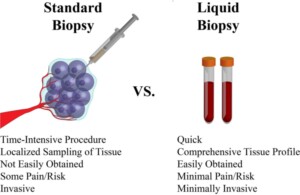There has been a discussion here about liquid biopsy and cancer blood test that detects multiple cancers. A recent article in Medscape Medical News gives an update on the Galleri blood test (developed by Grail). The Galleri test uses cell-free DNA (cfDNA) and machine learning to detect a common cancer signal across more than 50 cancer types as well as to predict cancer signal origin (CSO).
The test was used in a trial in 6621 healthy individuals aged over 50, with or without additional cancer risk factors (such as history of smoking or genetic risk). It found a positive cancer signal in 92 individuals (1.4%). None of the individuals who tested positive were known to have cancer at the time of testing. Subsequent work-up, which could include scans and/or biopsy, found cancer in 38% of those with a positive test.
Implications of the cancer blood test trial results
Only about 40% of patients with a positive test result were actually found to have cancer. Conversely, about 60% of patients with a positive test result likely suffered from a considerable amount of anxiety that may persist even after further testing did not reveal a malignancy. There were more false positives than true positives and there were a significant number of invasive procedures in false positives, which could cause harm to these patients who don’t have cancer.
Another important issue is that such testing may incur substantial healthcare cost. Less than two participants per 100 had a positive test result, and those patients underwent further testing to interrogate the result. Whether or not the test will be cost-effective remains unknown. It is hoped that as the technology improves, costs will go down.
It also remains unclear if detecting cancer early will lead to better outcomes. The trial shows it is feasible to detect cancer using a blood test, but it was not designed to determine if the test can decrease cancer mortality, which is obviously the purpose of screening. What is exciting about this new paradigm is that many of the targeted cancers are cancers for which we don’t have standard screening.
The Galleri test is already available in the United States and is being offered by a number of US health networks. However, it is not approved by the US Food and Drug Administration and is not covered by medical insurance, so individuals must pay around $950 for it out of pocket.
Source:
Blood Test for Multiple Cancers: Many False Positives. Medscape Medical News. September 11, 2022
See also:
Early Cancer Detection by Metabolism-Based Test
OverC Multi-Cancer Detection Blood Test Kit

Pingback: Cancer Blood Tests Revolutionize Oncology - Bioinformatics Hub
With high sensitivity and low incidence/prevalence, positive predictive value should be low.